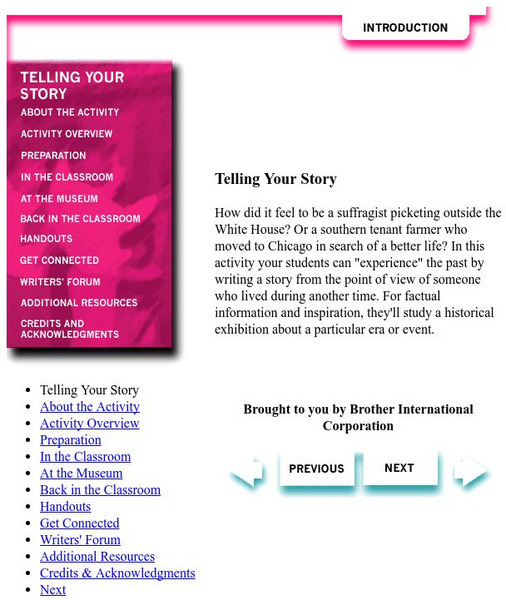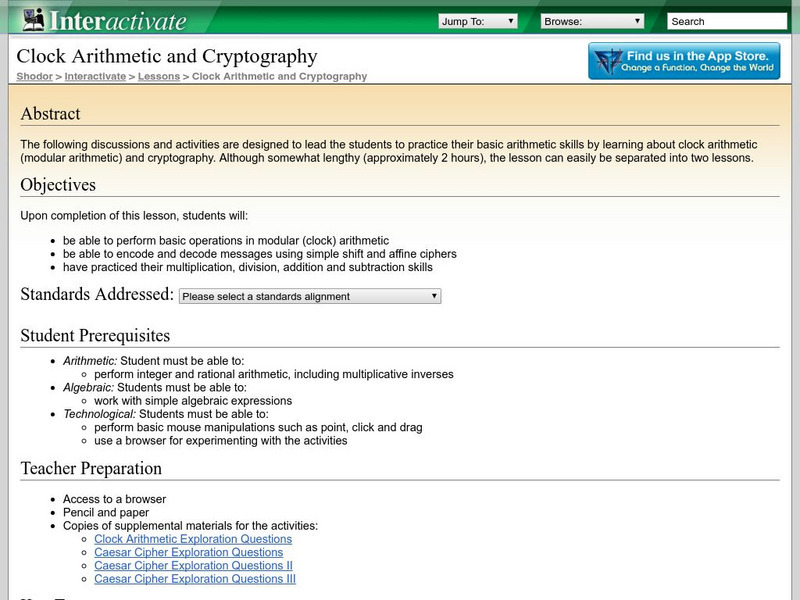Other
Nearpod: Telling Time to the Nearest Five Minutes
For this lesson on telling time to the nearest five minutes, young scholars explore analog and digital clocks by learning key vocabulary and exploring how they are the same and how they are different.
Other
Nearpod: Telling Time to the Half Hour
In this lesson on telling time to the half-hour, 1st graders explore analog and digital clocks by learning key vocabulary and exploring how they are the same and how they are different.
Other
Nearpod: Telling Time to the Hour
In this lesson on telling time to the hour, 1st graders explore analog and digital clocks by learning key vocabulary and exploring how they are the same and how they are different.
Other
Nearpod: Exploring Time to the Nearest Minute
In this lesson, 3rd graders will explore time to the nearest minute by learning key vocabulary, practicing telling time on different clocks, and analyzing real-world applications.
Alabama Learning Exchange
Alex: My Time!
A lesson designed to review telling time, record keeping, and calculating elapsed time.
Scholastic
Scholastic: Max's Math Adventures: The Snowball
Join Max and Ruthie on a snow day math adventure and see how many things can happen in just one day. Teachers will like this lesson's approach to experiencing and telling time. Use the teacher's guide, activity sheet, and extra...
Science Education Resource Center at Carleton College
Serc: American Field Guide: Relative Dating Telling Time Using Fossils
This website integrates video footage and information with lesson plans and activities to teach students about the concept of relative dating. Students will graph a range chart for ammonites, determine the geologic age for several rocks,...
Better Lesson
Better Lesson: Fractions of Time and Money
People talk about quarters of the hour, or quarters in a dollar. This lesson lets students in on what that means.
New York Times
New York Times: Evaluating Sources in a 'Post Truth' World: Fake News
[Free Registration/Login Required] Need help determining fake news from real news? This seems to be a problem today. Find practical activities and questions to help navigate a media landscape in which it is increasingly difficult to tell...
Alabama Learning Exchange
Alex: It's Number Time
This lesson can be used during whole group such as circle time or math moment. Students work with numbers in a variety of ways. This lesson can be used after students have been introduced to time, place value, skip counting,
Alabama Learning Exchange
Alex: Rockin' Around the Clock
This lesson will introduce students to the clock and telling time to the hour. This lesson plan was created by exemplary Alabama Math Teachers through the AMSTI project.
Climate Literacy
Clean: It's Time to Tell the Story About Buds, Leaves and Global Warming
In this activity, students explore how, in New England, the timing of color change and leaf drop of deciduous trees is changing.
Alabama Learning Exchange
Alex: Cows on the Clock
In this lesson students will calculate elapsed time using the storybook Click, Clack Moo: Cows That Type by Doreen Cronin. Students will identify the time pasted between two given times in a.m. and p.m.
Alabama Learning Exchange
Alex: The Elves Go on Strike!
Students will use their knowledge of elapsed time to determine if certain elves should receive a bonus. They will work cooperatively with groups to calculate elapsed time and present and justify their findings to their classmates.
Smithsonian Institution
Smithsonian Education: Telling Your Story
A lesson in which students gain empathy for people who lived during a historical time period by writing a first-person story with experiences that would have happened during that time.
Shodor Education Foundation
Shodor Interactivate: Lesson: Clock Arithmetic and Cryptography
This lesson plan is designed to guide students in practicing their basic arithmetic skills by learning about clock arithmetic and cryptography. Linked resources include helpful applets.
Library of Congress
Loc: Primary Sources and Personal Artifacts
This lesson plan introduces the practice of using primary sources; where to find primary sources, what they are, how to examine them, and how to construct a context to tell more of the story.
ArtsNow
Arts Now Learning: Realizing the Power of Your Own Creativity [Pdf]
In this lesson, students interpret a poem called 'The Little Blue Engine' by adding music, movement, visual art, and drama. After performing their creation, they will discuss any mathematical and/or scientific connections that have a...
ArtsNow
Arts Now Learning: A Day With Dali [Pdf]
In this lesson, 3rd graders will look at the print, "Persistence of Memory" by Salvador Dali and talk about what they observe, including the importance of foreground, middle ground, and background in a painting. Students will then...
Smithsonian Institution
Smithsonian Learning Lab: Prehistoric Climate Change and Why It Matters Today
In a lesson plan in this issue of Smithsonian in Your Classroom, students do the work of a team of paleontologists studying a time of rising carbon dioxide and rapid global warming during the Eocene epoch. By examining fossils of tree...
Writing Fix
Writing Fix: Fairy Tales in New Settings
After reading Bubba, The Cowboy Prince by Helen Ketteman, the writer will first choose a fairy tale that he/she is very familiar with. Next, he/she will choose a completely different setting (time and place) for their story. The writer...
Other popular searches
- Telling Time Lesson
- Calendar Telling Time
- Telling Time Analog
- Spanish Telling Time
- Telling Time to the Half Hour
- Telling Time Clocks
- Telling Time Worksheets
- Telling Time to the Hour
- Telling Time to the Minute
- Telling Time Hour
- Telling Time Minute
- Telling Time Lesson Plans












